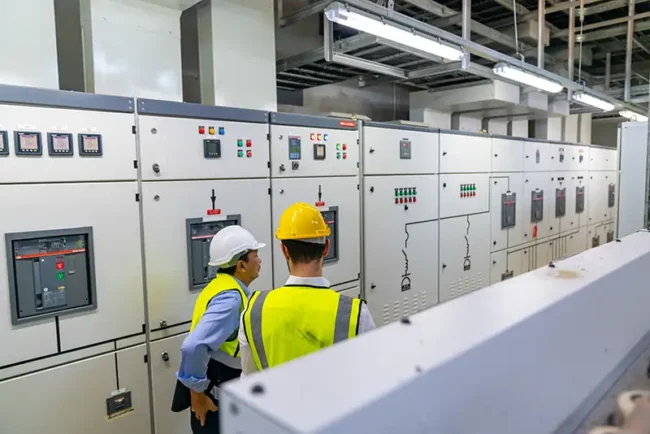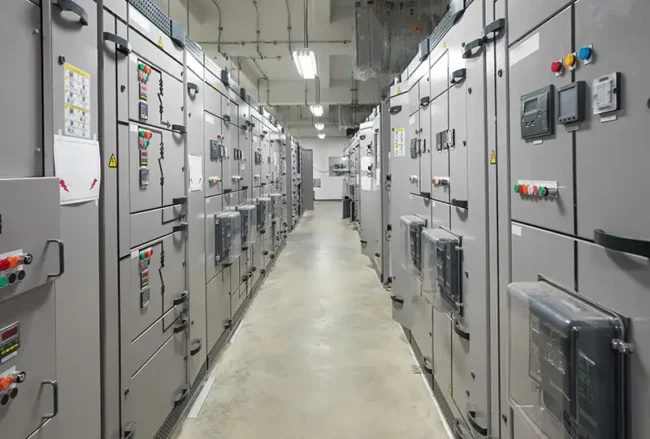The Role of an Industrial Electrical Contractor in Modern Construction
 RUS Industrial’s electrical contractors are highly specialized teams crucial to the success of large-scale industrial construction projects. Unlike residential or commercial electricians, industrial electrical contractors possess the unique expertise and equipment necessary to handle the complex and often hazardous industrial electrical systems found in manufacturing plants, power generation facilities, chemical processing plants, and other heavy industrial environments. Their work encompasses everything from initial design and engineering to installation, maintenance, and troubleshooting of high-voltage systems, control panels, motor controls, instrumentation, and complex automation systems.
RUS Industrial’s electrical contractors are highly specialized teams crucial to the success of large-scale industrial construction projects. Unlike residential or commercial electricians, industrial electrical contractors possess the unique expertise and equipment necessary to handle the complex and often hazardous industrial electrical systems found in manufacturing plants, power generation facilities, chemical processing plants, and other heavy industrial environments. Their work encompasses everything from initial design and engineering to installation, maintenance, and troubleshooting of high-voltage systems, control panels, motor controls, instrumentation, and complex automation systems.
The stringent safety regulations, specialized equipment, and demanding operational requirements of industrial settings necessitate a contractor with a deep understanding of these unique challenges. They are adept at working with high-capacity electrical loads, understanding intricate wiring schematics for machinery, and ensuring compliance with industry-specific codes and standards, such as those set by the National Electrical Code (NEC) and OSHA. Their role is not merely about wiring and connections; it extends to optimizing electrical efficiency, enhancing system reliability, and integrating advanced technologies that underpin modern industrial operations.
Why Engage an Industrial Electrical Contractor for Your Industrial Construction Project?
Engaging a specialized industrial electrical contractor offers numerous benefits that are critical for the successful and safe execution of industrial construction projects. These projects often involve substantial capital investment and demanding timelines, making the expertise of a dedicated industrial electrical contractor invaluable.
Specialized Expertise and Technical Acumen
Industrial electrical contractors bring a level of specialized expertise that general electrical contractors simply do not possess. They are proficient in handling complex electrical systems, including high-voltage distribution, motor control centers (MCCs), programmable logic controllers (PLCs), distributed control systems (DCS), and sophisticated instrumentation, especially for mission-critical projects. Their teams are typically composed of highly trained electricians, engineers, and technicians who understand the nuances of industrial processes and the electrical demands they entail. This specialized knowledge ensures that all electrical components are correctly sized, installed, and integrated to support the specific operational requirements of the facility. They are also well-versed in the latest industrial technologies and can recommend and implement solutions that enhance efficiency, automation, and safety. Their ability to interpret complex blueprints and design specifications for large-scale industrial machinery and production lines is paramount. This deep technical acumen minimizes errors, reduces downtime, and ensures the longevity and reliability of the electrical infrastructure.
Adherence to Stringent Safety Standards
Safety is paramount in industrial environments, and electrical work poses significant risks if not handled correctly. Industrial electrical contractors are experts in adhering to and implementing rigorous safety protocols. They are intimately familiar with OSHA regulations, NFPA 70E (Standard for Electrical Safety in the Workplace), and other industry-specific safety standards. Their personnel undergo extensive training in arc flash protection, lockout/tagout procedures, confined space entry, and hazardous material handling. By employing an industrial electrical contractor, project owners can be confident that all electrical installations will meet the highest safety standards, protecting personnel, equipment, and the overall integrity of the facility. Their proactive approach to safety minimizes the risk of accidents, injuries, and costly litigation, which is a critical consideration in high-risk industrial settings. They perform detailed risk assessments and develop comprehensive safety plans tailored to each specific project.
Cost Efficiency and Project Optimization
While it might seem counterintuitive, hiring a specialized industrial electrical contractor like RUS Industrial can lead to significant cost savings and project optimization in the long run. Their expertise allows for accurate project planning, precise budgeting, and efficient execution, minimizing costly delays and rework. They can identify potential issues early in the design phase, mitigating expensive changes during construction. Furthermore, their experience with industrial-grade materials and equipment ensures that durable, reliable components are selected, reducing maintenance costs and increasing the lifespan of the electrical systems. Their efficiency in managing complex installations means projects are completed on schedule and within budget, preventing costly overruns often associated with less experienced contractors. By optimizing electrical system designs, they can also contribute to lower operational energy costs over the life of the facility.
Integrated Solutions and Reduced Contractor Count with Self-Performance
Many industrial electrical contractors, such as RUS Industrial, offer integrated solutions through self-performance, which significantly benefits industrial construction projects. Self-performing means the contractor directly employs the skilled labor and owns the necessary equipment to complete various aspects of the project, rather than relying heavily on subcontractors. This approach reduces the number of disparate contractors on a job site, simplifying project management and communication. With fewer points of contact, there is improved coordination, better accountability, and a more streamlined workflow. This reduction in the contractor count leads to enhanced efficiency, as all aspects of the electrical work are managed under one cohesive entity. Self-performance allows for greater control over project quality, safety, and scheduling, as the contractor is directly responsible for the performance of their own crews. This unified approach minimizes conflicts between trades, accelerates decision-making, and ultimately results in a more efficient and cost-effective project delivery for the client.
Mission-Critical Electrical Contracting by RUS Industrial
 RUS Industrial excels in mission-critical electrical contracting, specializing in delivering robust and reliable electrical infrastructure for facilities where uninterrupted operation is paramount. This includes data centers, hospitals, emergency response centers, and critical manufacturing facilities where any downtime can result in significant financial losses, compromised safety, or disruption of essential services. Their expertise in designing and installing redundant power systems, uninterruptible power supplies (UPS), generators, and sophisticated control systems ensures maximum uptime and operational resilience, even in the face of power outages or system failures.
RUS Industrial excels in mission-critical electrical contracting, specializing in delivering robust and reliable electrical infrastructure for facilities where uninterrupted operation is paramount. This includes data centers, hospitals, emergency response centers, and critical manufacturing facilities where any downtime can result in significant financial losses, compromised safety, or disruption of essential services. Their expertise in designing and installing redundant power systems, uninterruptible power supplies (UPS), generators, and sophisticated control systems ensures maximum uptime and operational resilience, even in the face of power outages or system failures.
Long-Term Support and Maintenance
The relationship with an industrial construction contractor often extends beyond the initial installation. Many offer comprehensive maintenance services, including preventative maintenance, emergency repairs, and system upgrades. This ongoing support ensures that the electrical systems continue to operate at peak efficiency and reliability throughout their lifespan. Regular maintenance helps to identify and address potential issues before they escalate into major problems, preventing costly downtime and extending the life of the equipment. Having a trusted partner for long-term support provides peace of mind and ensures the continued smooth operation of the industrial facility. They can also provide training to internal facility staff on the newly installed or upgraded systems.
